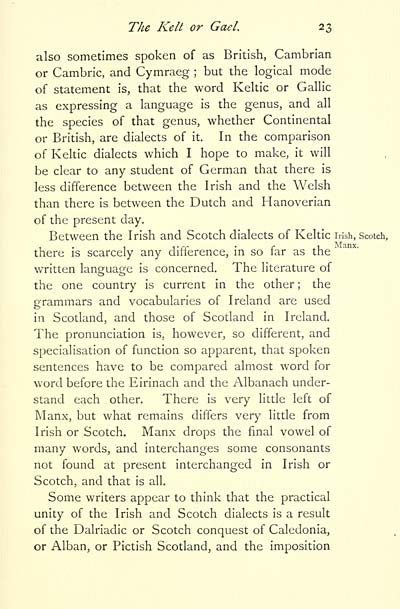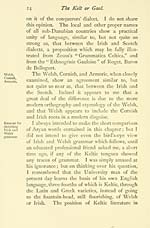Blair Collection > Kelt or Gael
(27)
Download files
Complete book:
Individual page:
Thumbnail gallery: Grid view | List view

The Kelt or Gael, 23
also sometimes spoken of as British, Cambrian
or Cambric, and Cymraeg ; but the logical mode
of statement is, that the word Keltic or Gallic
as expressing a language is the genus, and all
the species of that genus, whether Continental
or British, are dialects of it. In the comparison
of Keltic dialects which I hope to make, it will
be clear to any student of German that there is
less difference between the Irish and the Welsh
than there is between the Dutch and Hanoverian
of the present day.
Between the Irish and Scotch dialects of Keltic Irish, Scotch,
there is scarcely any difference, in so far as the
written language is concerned. The literature of
the one country is current in the other; the
grammars and vocabularies of Ireland are used
in Scotland, and those of Scotland in Ireland.
The pronunciation is, however, so different, and
specialisation of function so apparent, that spoken
sentences have to be compared almost word for
word before the Eirinach and the Albanach under-
stand each other. There is very little left of
Manx, but what remains differs very little from
Irish or Scotch. Manx drops the final vowel of
many words, and interchanges some consonants
not found at present interchanged in Irish or
Scotch, and that is all.
Some writers appear to think that the practical
unity of the Irish and Scotch dialects is a result
of the Dalriadic or Scotch conquest of Caledonia,
or Alban, or Pictish Scotland, and the imposition
also sometimes spoken of as British, Cambrian
or Cambric, and Cymraeg ; but the logical mode
of statement is, that the word Keltic or Gallic
as expressing a language is the genus, and all
the species of that genus, whether Continental
or British, are dialects of it. In the comparison
of Keltic dialects which I hope to make, it will
be clear to any student of German that there is
less difference between the Irish and the Welsh
than there is between the Dutch and Hanoverian
of the present day.
Between the Irish and Scotch dialects of Keltic Irish, Scotch,
there is scarcely any difference, in so far as the
written language is concerned. The literature of
the one country is current in the other; the
grammars and vocabularies of Ireland are used
in Scotland, and those of Scotland in Ireland.
The pronunciation is, however, so different, and
specialisation of function so apparent, that spoken
sentences have to be compared almost word for
word before the Eirinach and the Albanach under-
stand each other. There is very little left of
Manx, but what remains differs very little from
Irish or Scotch. Manx drops the final vowel of
many words, and interchanges some consonants
not found at present interchanged in Irish or
Scotch, and that is all.
Some writers appear to think that the practical
unity of the Irish and Scotch dialects is a result
of the Dalriadic or Scotch conquest of Caledonia,
or Alban, or Pictish Scotland, and the imposition
Set display mode to: Large image | Transcription
Images and transcriptions on this page, including medium image downloads, may be used under the Creative Commons Attribution 4.0 International Licence unless otherwise stated. ![]()
| Early Gaelic Book Collections > Blair Collection > Kelt or Gael > (27) |
|---|
| Permanent URL | https://digital.nls.uk/75786981 |
|---|
| Description | His ethnography, geography and philology. |
|---|---|
| Shelfmark | Blair.17 |
| Additional NLS resources: | |
| Attribution and copyright: |
|
| Description | A selection of books from a collection of more than 500 titles, mostly on religious and literary topics. Also includes some material dealing with other Celtic languages and societies. Collection created towards the end of the 19th century by Lady Evelyn Stewart Murray. |
|---|
| Description | Selected items from five 'Special and Named Printed Collections'. Includes books in Gaelic and other Celtic languages, works about the Gaels, their languages, literature, culture and history. |
|---|

